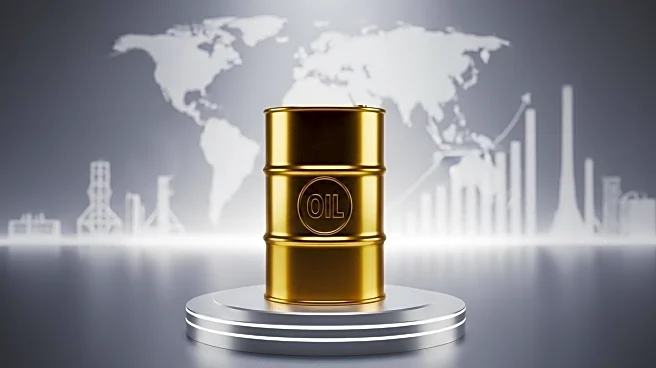What is the story about?
What's Happening?
Saudi Aramco, the world's largest oil company, has announced its capability to sustain oil production at its maximum capacity of 12 million barrels per day (bpd) for a year without requiring additional investments. This announcement was made by Amin Nasser, the chief executive of Saudi Aramco, during the Energy Intelligence Forum in London. Despite concerns about the reversal of OPEC+ cuts and the vulnerability of spare capacity to supply shocks, Saudi Arabia holds the largest spare capacity globally, estimated at over 2 million bpd. However, it may be as low as between 600,000 bpd and 1 million bpd that can be quickly mobilized and sustained. Saudi Aramco expects global oil demand to continue growing, with forecasts indicating an increase of between 1.1 million bpd and 1.3 million bpd in 2025, and another 1.2 million bpd to 1.4 million bpd the following year.
Why It's Important?
The ability of Saudi Aramco to maintain high levels of oil production is crucial in the context of global energy demands and market stability. As the world continues to grapple with energy transition challenges, hydrocarbons remain a significant component of global energy supply. Aramco's strategy to remain dominant in oil production is supported by its massive resource base, low costs, and low upstream carbon intensity. This approach underscores the pressing need for long-term investments in oil supply, which is widely accepted as necessary to meet resilient demand. The company's forecasts for growing oil demand highlight the ongoing reliance on hydrocarbons as a backbone of global energy and prosperity, despite the push for energy transition.
What's Next?
Saudi Aramco's announcement may influence global oil market dynamics, particularly in terms of pricing and supply stability. As the company continues to project bullish demand forecasts, stakeholders in the energy sector may need to reassess their strategies and investments in oil production and alternative energy sources. The potential for supply shocks remains a concern, and the industry may see increased efforts to secure and expand spare capacity. Additionally, the discourse around energy transition versus energy addition may shape future policy and investment decisions, as countries and companies navigate the complexities of meeting energy demands while transitioning to sustainable sources.
Beyond the Headlines
The broader implications of Saudi Aramco's sustained oil output capacity touch on ethical and environmental dimensions. The reliance on hydrocarbons raises questions about the environmental impact and the pace of transitioning to cleaner energy sources. As the energy sector continues to evolve, the balance between meeting immediate energy needs and investing in sustainable solutions will be critical. The dialogue around energy transition versus addition may also influence cultural perceptions of energy consumption and the role of oil in future economic growth.















